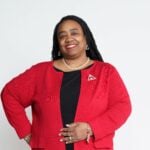“You can pray until you faint. But if you don’t get up and try to do something, God is not going to put it in your lap. And I believe … that one day in Mississippi — if I have to die for this -— we shall overcome.” Fannie Lou Hamer
Fannie Lou Townsend Hamer (1917-1977) was an activist and civil rights leader who advocated for voting rights and racial equity for Black Americans. She was the recipient of many accolades as well as honorary membership in Delta Sigma Theta Sorority Inc., a public service organization. The youngest of 20 children, she was born to Lou Ella and James Townsend, sharecroppers in Mississippi, on Oct. 6, 1917. Hamer grew up in poverty and left school to work the cotton fields when she was 12 years old. In 1944, she married Perry “Pap” Hamer. The couple worked on a plantation together for 18 years.
In 1961, Hamer attended a meeting of the Student Non-Violent Coordinating Committee (SNCC) and Southern Christian Leadership Conference (SCLC). Hamer was upset about the move to hinder Blacks from voting. She joined SNCC as an organizer and spearheaded the effort to encourage Blacks to register to vote at the Indianola, Mississippi, courthouse. The group was prohibited from voting due to the use of an unfair literacy test.
After this she was fired by the plantation owner where she worked and lived. Eventually, the Hamers were forced to leave.
In June of 1963, Hamer was traveling back with other activists from a literacy workshop. Stopping in Winona, Mississippi, the group was arrested on a false charge and jailed. While being held, Hamer and her colleagues were beaten almost to death by the police.
Despite this harrowing experience, Hamer continued to organize voter registration drives. She later co-founded the Mississippi Freedom Democratic Party (MFDP). In 1964, the MFDP challenged the all-white Mississippi delegation to the Democratic National Convention in Chicago, Illinois. She told the committee, in a televised presentation, how Blacks were being prevented from voting across the country. “If the Freedom Democratic Party isn’t seated today, I question America,” Fannie told the Credentials Committee. “Is this America where we have to sleep with our phones off the hooks because we be threatened daily just ‘cause we want to register to vote to become first-class citizens.” Her advocacy resulted in enabling two delegates of the MFDP being given speaking rights at the convention.
Hamer had a deep love and concern for children which was expressed in her advocacy for education. She admonished Black teachers to “teach our children more about our history since school books left it out.” This unfortunately still rings true today.
Fannie Lou Hamer is an amazing and powerful example of the power of one person who is committed to affecting change. We stand at a precipice in our country. A great awareness of the lived experience of Black Americans has occurred over the last year.
The wider community is reading books, having dialogues about systemic racism and its continued negative effect on historically excluded groups. Still more is required. We must look inward to determine what we can do to change the trajectory of our country for the better. Each person has the power to make a difference.
Writing your representatives, running for office, assisting with a campaign, creating an organization or joining an existing one, and most importantly, if you see something say something. We cannot sit by and allow injustice to continue. We have to be the change we want to see in the world. This work is not easy, but it’s vital to the very survival of our country and this experiment called democracy. Lifting as we climb.
Preamble to the U.S. Constitution: “We the People of the United States, in Order to form a more perfect Union, establish Justice, ensure domestic Tranquility, provide for the common defense, promote the general Welfare, and secure the Blessings of Liberty to ourselves and our Posterity, do ordain and establish this Constitution for the United States of America.”
Take some time to read the United States Constitution, Bill of Rights and 27 amendments. What can you do to create “a more perfect union”? We can learn so much from Hamer and others. Civil rights leaders Coretta Scott King said, “Struggle is a never-ending process. Freedom is never really won. You earn it and win it in every generation.”
Nichelle M. Hayes is a native of Indianapolis. She is an information professional, a genealogist, civic leader, freedom fighter and a lifelong learner.







